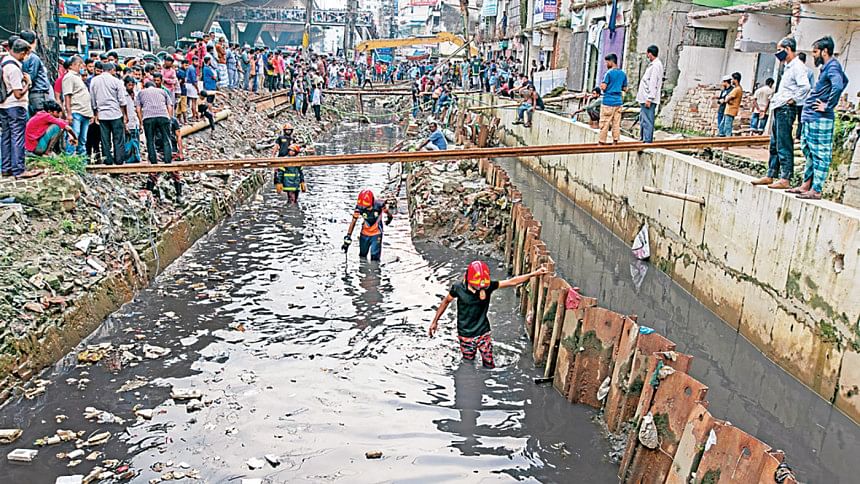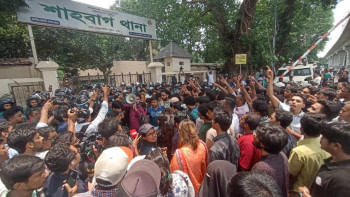The Hills Have Eyes

I don't remember the last time I went to Chattogram. My knowledge of the port city can be summed up by the memorable quote from the epic fantasy series, Game of Thrones, where the main protagonist is told: "You know nothing, Jon Snow."
A piece of news made me venture into the abyss of the unknown. On Wednesday, a certain Saleh Ahmed (55) was wading through a waterlogged road in Chattogram when he slipped and plunged into a nearby canal. There has been no sign of the body that disappeared in the Chashma Canal. Firemen are keeping an eye for the body to surface as their initial search has yielded no results. In the last five years, at least six people have died in this canal that flows into Karnaphuli river, including a CNG auto-rickshaw carrying a passenger. Mind it, we are talking about the disappearance of a citizen from the heart of a city, not of a trekker lost in the wilderness. It tells a lot about our urban planning and management.
Instead of unfolding my ignorance over the waterlogging issue caused by that illegal settlements and unplanned urbanisation; dried-up canals through illegal refilling; garbage accumulation and encroachment of drains; landslides during torrential rains; lack of coordination among different service agencies; and lack of political will and civic behaviour—I shall instead focus on an image that struck me after I heard the canal's name: chashma. Chashma or eyeglasses, according to Collins dictionary, "are two lenses in a frame that some people wear in front of their eyes in order to help them see better".
Saleh Ahmed failed to see that the road underwater had merged with the canal. He disappeared while trying to cross the road on his way to the shrine at Muradnagar. Google Maps helped me locate the canal near a hill of the same name. The canal, if I have understood correctly, flows from the nearby Chashma Hill and ferries water to the river and then to the sea. The man, a vegetable trader, died under the watchful eyes of the hill and the canal. I am sorry if the reference reminds you of the horror film The Hills Have Eyes. But this incident has no horror plot or link to any urban legend suggesting that the man had offended one of the holy men in the shrines or that the canal demanded human sacrifices to keep its flow. It is an accident as the victim failed to see. The question is: Whose fault is it that he couldn't see? Can we afford not to see when an accident like this happens? Where is the body now? Stuck somewhere in the cornice of a hill? Stuck in the silt and filth of the blocked canals, flown into the river, or carried to the sea to become shark meal?
The uniqueness of Chattogram lies in its topography. Here we have a city that houses hills, plains, canals, rivers, and the Bay area. A 1969 survey under the "Storm Drainage and Flood Control Master Plan and Feasibility Report for Chattogram", conducted by the US-based engineering firm JR Snell, identified 34 canals in Chattogram. Twelve of those canals do not exist anymore, and eight are in the process of dying. Of them, Chatkhai Canal has the ill fame of being the "Sorrow of Chittagong." If this downward trend continues, what future do we have for the water bodies? The lost body of Saleh Ahmed creates a spectacle to reflect on the condition of manmade disasters. His death, in a way, is a performative act. We may not hear it, but we can feel its silence. It is easy to blame the downpour for the waterlogging. The incident at the Chashma Canal makes us see such rain as the cry of the sky. Nature exists in an organic whole; if one body is hurt, the other part feels it too.
Surely, there are agencies to see this and dismiss my poetic rendering as illusory as the birthplace of Rama. A simple Google search produced the names of three key actors. The Chattogram City Corporation (CCC) is responsible for the drainage system besides houses, roads, and rainwater management. The Chattogram Development Authority (CDA) deals with primary and larger canals. Chattogram WASA (CWASA) takes care of sanitation and storm-water management. My colleague from Chattogram tells me that these three agencies become hyper-active only during the monsoon (and I believe him, because the Dhaka officials are no different). The lack of coordination among them is evident from the city flyovers where you can see that one agency digs and fills up the road, and then another agency repeats the performance soon after. One agency vacates the illegal settlements, while the others allow new ones to grow. It seems like a recitation competition where everyone is given the same poem to recite. Ideally, everyone should play a certain part of the play to complement one another so as to complete the act. According to experts, these institutions are either over-mandated or under-mandated for drainage system management. The end result is a mess. It must be dealt with urgently, otherwise tragedies like that of Saleh Ahmed will keep occurring.
From my safe distance in the capital, it is difficult for me to fathom the gravity of the situation. Just like it is difficult for us to imagine why desperate Afghans were clinging on to the body of a plane to escape from Kabul that had fallen. The spectacle made us aware of the horror that returned to a space that was beginning to feel the air of freedom and democracy. The image of the bodies falling off the plane created a spectacle. The sight and sound of it had reached many shores including ours. Unfortunately, sometimes we get excited over things that happen afar while we miss things that occur in our own backyard.
Wasn't it Tagore who famously wrote in Sphulingo (Sparks):
"I've gone to see the mountains, the oceans I've been to view.
But I haven't seen with these eyes
What two steps from my home lies
On a sheaf of paddy grain, a glistening drop of dew."
Tears of Saleh add "a glistening drop of dew" to the waters of the Chashma canal, by extension to the Karnaphuli river, and to the sea. One can only hope that the pair of spectacles will be fixed soon. The frame needs to be fixed. Only then will we "see better" (as the fool advised King Lear in Shakespeare's tragedy) and see the misery of the common man.
Shamsad Mortuza is Acting Vice-Chancellor of the University of Liberal Arts Bangladesh (ULAB), and a professor of English at Dhaka University (on leave).

 For all latest news, follow The Daily Star's Google News channel.
For all latest news, follow The Daily Star's Google News channel. 



Comments